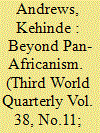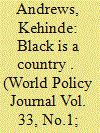| Srl | Item |
| 1 |
ID:
155140


|
|
|
|
|
| Summary/Abstract |
Pan-Africanism is an identifiable movement with its own history and historical and ideological roots. It formally began at the first Pan-African Congress in London in 1900 and has a distinct linage up to the present day African Union. Unfortunately, the movement has not presented a challenge to imperial domination in Africa, rather it has helped continue the exploitation of the continent. Accepting the colonial nation state has prevented any politics of liberation from developing in the movement. It is central to decentre Pan-Africanism from radical histories of resistance because the movement developed in parallel to and rejection of more revolutionary, anti-imperial politics. Garveyism developed a mass movement rooted on the global Black nation, shattering the boundaries of Westphalian sovereignty. Malcolm X picked up the work of Garvey, developing on some of its regressive weakness to form the Organization of Afro-American Unity. By unpicking this tradition from Pan-Africanism we can begin to chart a route to revolutionary concepts and practice of nationalism that can present a challenge to the imperial social order.
|
|
|
|
|
|
|
|
|
|
|
|
|
|
|
|
| 2 |
ID:
144408


|
|
|
|
|
| Summary/Abstract |
Racism transcends borders and so too must the fight against it, argues Kehinde Andrews. Too often, analyses of race are hemmed in by “methodological nationalism,” or the tendency to frame our thinking around the nation-state. Instead, Andrews says, the African diaspora should unite across oceans and boundaries to form a country based on freedom and equality for Black populations.
|
|
|
|
|
|
|
|
|
|
|
|
|
|
|
|